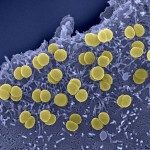Lien vers Pubmed [PMID] – 15614687
Clin. Infect. Dis. 2005 Jan;40(1):17-25
BACKGROUND: In addition to frequent epidemics of group A meningococcal disease, endemic bacterial meningitis due mostly to Neisseria meningitidis, pneumococcus, and Haemophilus influenzae type b is a serious problem in sub-Saharan Africa. The improved ability to identify the etiologic agent in cases of bacterial meningitis will facilitate more rapid administration of precise therapy.
METHODS: To describe the epidemiology of bacterial meningitis and evaluate the usefulness of field-based polymerase chain reaction (PCR) testing, we implemented population-based meningitis surveillance in Burkina Faso during 2002-2003 by use of PCR, culture, and antigen detection tests.
RESULTS: Among persons aged 1 month to 67 years, the incidences of meningococcal meningitis, pneumococcal meningitis, and Haemophilus influenzae type b meningitis were 19 cases (n=179), 17 cases (n=162), and 7.1 cases (n=68) per 100,000 persons per year, respectively. Of the cases of meningococcal meningitis, 72% were due to N. meningitidis serogroup W135. Pneumococcal meningitis caused 61% of deaths and occurred in a seasonal pattern that was similar to that of meningococcal meningitis. Of cases of pneumococcal meningitis and N. meningitidis serogroup W135 meningitis, 71% occurred among persons >2 years of age. Most patients, regardless of the etiology of their illness and the existence of an epidemic, received short-course therapy with oily chloramphenicol. Compared with culture as the gold standard, the sensitivity and specificity of PCR in the field were high; this result was confirmed in Burkina Faso and Paris.
CONCLUSIONS: Precise and rapid identification of etiologic agents is critical for improvement in the treatment and prevention of meningitis, and, thus, PCR should be considered for wider use in Africa. Vaccines against Streptococcus pneumoniae, N. meningitidis (including serogroup W135), and H. influenzae type b all will have a major impact on the bacterial meningitis burden. Antibiotic recommendations need to consider the importance of S. pneumoniae, even during the epidemic season.

